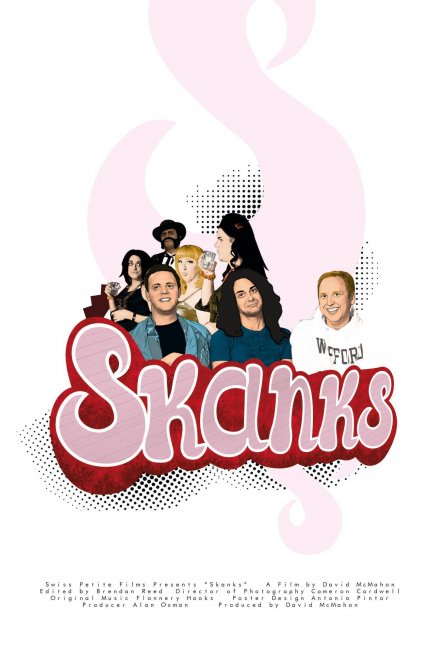People need their own space. Not just a modicum of personal space, but also some location where they can be themselves and be around people like them. It can be easy to forget the importance that a community provides, especially if you are part of the majority (full confession: I’m a white, cisgendered, straight male who was raised Christian). For far too many groups, others who are not like them — some of whom refuse to engage or even understand what it’d be like to experience life in their shoes — dictate their lives. Rich proscribe how the poor should live; men say how women’s bodies should be governed; and the offenses go on. So these enclaves provide a place where people can speak freely, not worried about being seen as different, judged to be abnormal, told they are wrong. David McMahon’s documentary Skanks looks at one of these ports in the storm, a small community that bands together — not to change the world, but to celebrate each other. An examination of voices too often drowned out, the documentary focuses on the joy to be found in these communities and the ways they enrich the lives of their members.
Set against the backdrop of Alabama’s two main religions, hardcore Christianity and college football, the Theatre Downtown is a small theater company located in an antique shop in Birmingham. Director and playwright Billy Ray Brewton is helming his latest opus, a campy musical called “Skanks in a One Horse Town.” It’s an over-the-top show featuring drag queens, Studio 54, time-traveling harlots, and musical numbers about taking it up the butt. Brewton, like many in the cast, is gay, and McMahon focuses on their stories of growing up different in the monoculture of the most conservative state in the country (a historian points out that Alabama recently beat out Wyoming for that title). Time is spent with many of the members of the cast and crew (and their relatives) as they prepare for the debut, but special attention is given to Chuck Duck, Jr. (best name ever?), who is playing the lead skank in the play. Duck has led an interesting life from absolutely killing it as a Prince impersonator in a high school talent show; he then joined the Army, learned he was HIV positive, and is now a hairdresser and charismatic lead in Brewton’s play. McMahon follows Duck as he visits with his archly religious parents, who are conflicted on how to bridge the divide between loving their gay son and adhering to the strict conservative values they believe in. Duck reveals that this schism, along with his diagnosis, launched him into a depression that he was only able to overcome by throwing himself into Theatre Downtown productions and shining on stage.
Skanks’ structure is essentially following the process of rehearsal to opening night, with some digressions to learn more about the people involved. There are no dramatic conflicts or even any character arcs. No confrontation scene where the Theatre Downtown group is picketed or how the production wins over the simple townsfolk of Birmingham by performing a fabulous musical number. But this isn’t a negative; instead of forced editing to create fake drama, McMahon is confident enough to simply provide a snapshot of a group that would be otherwise overlooked, swept away in the Crimson Tide of the football fanatics. The camerawork is all handheld and simple, focusing on the interview subjects and the cast as they perform. It would have been nice for a more elevated aesthetic approach — there are few stylistic flourishes, mostly the oft-used “stage shot” of the blinding spotlights that has been a staple since at least the 1970s — but the cinematography serves the focus of the film well.
Skanks is simply an observation of people banding together to make something that they think is fun and hopefully delights others who are like them. But this specific story of a group in a Southern metropolis ends up being one that many can relate to: if you were a freak and/or geek in high school, then this speaks to that pride in the face of exclusion. Or if you ever formed a small group to rebuild a car, run a D&D campaign, jam out on instruments, or make crafts, this film replicates the unity and camaraderie in that shared activity. It’s the sensation of carving out your own space in a world that tries so hard to force people into molds. The film chronicles the joys of creating inside jokes, nicknames for each other, and generally just letting yourself be you. McMahon is helping these people tell their own stories, shining a light on them when it would be just as easy to cast them aside. As a result, Skanks is both a celebration of what happens when the outsiders band together and a reminder there is a safe haven out there for everyone; you just have to know where to look.

